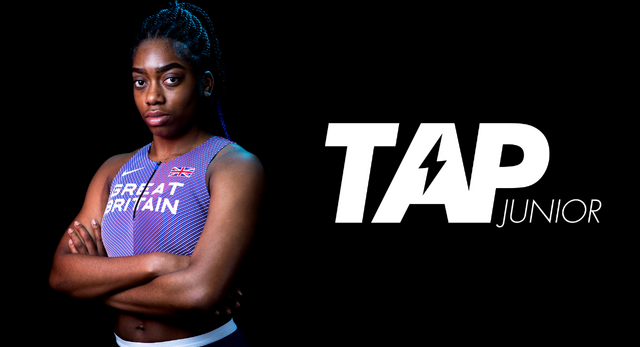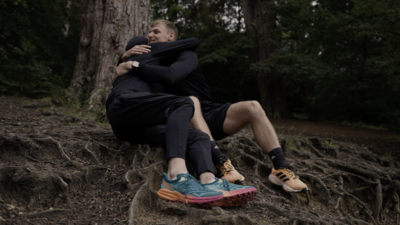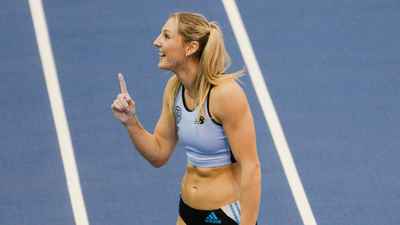Athlete Mental Health
Sport can be an emotional rollercoaster, and if we're not careful, mental health struggles can set in. Here, we look at some of the causes and strategies that can help.
We all want to feel happy, right? But there are just so many things that can affect our mood, some of which we have control over and others we don't. Finding ways to manage these to allow us to ride the inevitable storms and protect our well-being should be our priority.
As an athlete, you'll probably feel you're on an emotional rollercoaster... one minute, you're improving or, better still, winning and on a high; the next, you're in the pits of gloom, wondering why performances aren't going to plan with improvement feeling impossible. Welcome to the athlete's world!!
Even the Best Struggle
Recent media stories about high-profile sportspeople like Simone Biles, Naomi Osaka, and Tottenham Hotspurs' Richarlison, just three of the many, have brought much-needed attention and demonstrated that every athlete, at every level, and from every sport, is at risk.
So, why is this? One crucial contributing factor is that athletes face many demands. As a school student-athlete, you're no different. You face school, social, life and sports pressures that can all become challenging. At times, it can all feel too much, and if the resulting stress is left unaddressed, it can lead to conditions like anxiety, depression, eating disorders, and burnout.
But it doesn't have to be this way.
There are many things we can do to help ourselves. Here, we break down, into logical steps, the helpful things that you can do to get yourself on the road to recovery.
Acknowledge You're Struggling
It sounds so obvious, but we can all convince ourselves we're okay when we really aren't. All this does is allow the unaddressed issue to escalate, making it harder to overcome further down the line. Accepting that things aren't great, that you're struggling, and that you need help is the biggest step.
You're Not Alone
By far, the most important thing to know is that you're not alone. Other athletes have been there, they understand, and they will want to help. We're all in this together as fellow sportspeople, and we look out for each other, OUR TRIBE.
It can be tempting to think you're the only one struggling, but it really is not true. The chances are several of your friends or training partners will also be struggling, often in silence and feeling alone... the whole 'me too' thing regarding mental health in sports is huge, but until you speak out, you won't be able to tap into the support that is out there.
Remember, seeking help is a sign of strength, not weakness.
Speaking Out
The reluctance to divulge struggles internalises problems, making the road to recovery a more difficult and lonely one.
Athletes are often hesitant to seek support because of a sports culture that prioritises physical strength and resilience over mental well-being. You may fear appearing 'weak', especially to other athletes, as image and ego are all part of competitive sports. This particular aspect can be a significant concern if you feel you risk non-selection if others think of you as 'mentally vulnerable'...
But, acknowledging to others that you're struggling is anything but 'weak' and should instead be seen as a sign of strength because speaking out requires guts.
Support Network
Our generation 'gets' mental health struggles, and we also understand that we are all vulnerable. It's important to remember that your friends and training partners will want to help... just as you'd want to help them if they were in your shoes.
Reaching out works both ways:
It enables others to support you if you're the one who's struggling.
It gives others who may be struggling an opportunity to 'open up', allowing you to help them.
Starting the conversation will be the hardest part, but once that's done, it'll feel easier knowing someone's got your back. Feel proud that you have taken the first and most important proactive step to overcoming the cause.
Identifying Problems
Identifying the root cause of your struggles can help you work out the micro steps needed to address them.
Sometimes, multiple factors, such as family issues, friendship challenges, and school pressures, can add up, making it all feel too much. By prioritising and tackling one issue at a time, you may find that resolving one problem helps alleviate others.
Keeping Worries In Check
Every day brings us all something new to worry about; that's just part of being human, but when these worries start to roll out of control, we can find ourselves struggling. Keeping these unhelpful thoughts and feelings in check and, importantly, in perspective sounds so simplistic, but in real terms, it can feel challenging and, at times, impossible.
Athletes often over-identify as 'athletes', meaning their performances and results become unhealthily intertwined with happiness...
As sport involves a million and one uncontrollable factors, there is no way you can guarantee that everything will always go your way, demonstrating that this is a very unhelpful way of thinking. You are not your results!!
Should we really be losing sleep over one not-so-great performance? No, no, we should not. We're human. These things happen. It's all part of being an athlete. But try telling your mind that when you're going through a tough patch!!
Take a Step Back
When our mental health starts to slip, we can struggle to keep things in perspective. Taking a step back to view worries more objectively can help.
Imagine your best mate is the one struggling with the exact same issues...
What would you say to him/her?
What advice would you give?
What observations would you make?
This exercise helps you see your problems from outside of you. Importantly, it can help you notice the unkind, unfair, and outright untrue things you think about yourself, delivered by that seriously unhelpful inner voice.
Restricting social media
If you're struggling, you can feel worse by seeing other people's 'highlight reels'. Remember, very few will share their failures or imperfections... just the perfect stuff they're proud of to boost their own ego, intentionally or otherwise.
During difficult times, it might be helpful to have a bit of a social media 'detox'. An evening watching a well-chosen film is more likely to leave you feeling better than an evening of scrolling.
Coping Strategies
Coping strategies can be extremely helpful when struggling with mental health difficulties.
Mindfulness, for example, might sound a bit woo-woo, but there's plenty of evidence to suggest it works... MRI scans don't lie! Many of your athlete role models already use it as a mindset tool. In fact, FIFA announced Calm as the 'Official Mindfulness and Meditation Product' for the 2022 World Cup and 2023 Women's World Cup. The IOC has also supported its Olympic athletes through the Headspace app.
If the pros use it, why wouldn't you? There is more on this subject in our coping strategies lesson under Mindset.
NOTE: Whilst coping strategies can be helpful, there may be scenarios where wellbeing improvement cannot be achieved without the help of someone experienced in these matters. In these situations, it is essential you seek the help of a qualified mental health professional. Your GP will be a good starting point.
Breaking the Stigma
The best way for us all to help is by making conversations about wellbeing a normal part of daily chat. The more normal it becomes, the less awkward it will feel and the happier we'll ALL become. Ultimately, it’s down to all of us to break the stigma of mental ill-health and promote mental health awareness as an integral part of a compassionate society.
Take Home Points
Acknowledge to yourself that you're struggling.
Talk to someone... confide in a friend, family member, or health professional, e.g., a therapist or GP. 'A problem shared is a problem halved' as the saying goes :)
Take a step back to gain perspective.
Identify the cause of your struggles and the micro steps needed to address it.
Try reducing time on social media.
Remember, you're not alone.
Remember, too, your friends will always want to be there for you
IMPORTANT: ALWAYS seek professional advice from an accredited healthcare provider if mental health concerns escalate.
*DISCLAIMER: This content is for guidance only. If you or someone you know needs mental health support, we recommend you/they seek help from an accredited health professional.
Resources
Reaching out to mental health organisations can be helpful. They will offer a nonjudgmental, confidential, compassionate, and friendly listening ear, as well as support and guidance.
Sporting Wellness.org
Mind
Samaritans.org
Evidence-Based Research
Our content is supported by:
Haraldsdottir, K. and Watson, A.M., 2021. Psychosocial impacts of sports-related injuries in adolescent athletes. Current sports medicine reports, 20(2), pp.104-108. (View Paper)
Rice, S.M., Purcell, R., De Silva, S., Mawren, D., McGorry, P.D. and Parker, A.G., 2016. The mental health of elite athletes: A narrative systematic review. Sports medicine, 46, pp.1333-1353. (View Paper)








